Contents of this post:(1) “Call to Reject the Motion on Military Action in Syria and Iraq goes to Woman MPs from 38 Women’s Organizations” (Bianet)(2) "Presentation on Women's Realities in War" (Women for Peace)
Source: “38 Kadın Örgütünden Kadın Vekillere ‘Tezkereye Hayır’ Çağrısı” (“Call to Reject the Motion on Military Action in Syria and Iraq goes to Woman MPs from 38 Women’s Organizations”), Bianet, 1 October 2014, http://bianet.org/bianet/siyaset/158878-38-kadin-orgutunden-kadin-vekillere-tezkereye-hayir-cagrisi
38 women’s organizations have called upon women MPs to reject the motion on military action in Iraq-Syria and to oppose the proposal to establish either a buffer zone or a security zone in the region.
38 women’s organizations have released a statement addressed at women MPs in Turkey regarding the Iraq-Syria motion:
“We know and have studied on the field, what women experience during war times. As such, we are aware that women should not give way to policies that will fuel wars. Do not accept the motion, oppose the buffer or security zone.”
The statement drew attention to the problems that are likely to be encountered during cross-border military interventions. Women’s organizations emphasized that buffer or security zones are only ever initiated in uninhabited geographical locations, and yet, the proposed buffer zone includes Rojava. [Translators’ note: The population of Rojava is variously estimated as being between 2 and 3 million.]
Calling for peace, they noted that the proposal to institute buffer zones surfaced during the solution process [between the Kurds and the Turks].
“You are the mediators of representative democracy and the position you will take during this critical junction is historical and will determine the destiny of a people. That is why we ask you to pay attention to our call for peace.”
What will be the consequence?
The women’s organizations stated that the motion will result in Turkish soldiers engaging in cross-border armed conflicts and asked the following:
“However, who will this armed clash be against? Has this been specified? Have the sufferings, the hostilities, and the feelings of revenge that this clash will give rise to been thought out? This engagement is likely to result in a backlash from ISIS. Has this been taken into account?“
“It is important to remember: When the Soviet Union invaded Afghanistan, the United States retaliated, Taliban and Al Qaeda were born; when the United States invaded Iraq, ISID was born.”
The buffer zone
The women emphasized that buffer or security zones are only ever established in uninhabited geographical locations. A buffer zone in Rojava is likely to lead to the people of Rojava facing exile and mass migration:
“This means in turn the forced migration of hundreds of thousands of people, more deaths, more poverty, and more suffering. Even in optimal conditions, forced migration brings forth instability, not stability. It undoes, without recourse, civil life.
“It should be remembered: While Israel was settling in Palestinian lands, the world claimed that these lands were uninhabited. The United States massacred millions of native peoples as part of its expansion in the continent of America, claiming that the land was uninhabited, and attempted to cover it up. Australia was claimed to be uninhabited land when the British were sending in prisoners to this continent, leading to aboriginal children being stolen from their families and handed over to the settlers.
“The claim by some that a nation is uninhabited does not mean that that area is actually empty. On the contrary, it means that the region will be forcibly purged, resulting in blood and tears. Such an act saddles peoples’ conscience with the responsibility of massacres that cannot be met eye to eye, that cannot be answered for by multiple generations.”
The solution process
The women’s organizations emphasized that both the motion [on military conflict] and the idea of a buffer or a security zone came up during the solution process:
“Peace will not come through a process that ignores the will of the other and that discounts as empty the regions that are inhabited by their sisters, brothers, and relatives. Peace will not come with the presumption that considering one’s demands unilaterally would establish peace.
“War ends only when the will of the peoples is attended to, when their suffering is ended, when their homes are returned back to them. Because women pay the price of war very heavily, they are heavily invested in bringing an end to war. As women, there is no other option for us but to work together towards bringing an end to war and to the establishment of a permanent state of peace. That is why, first of all, we women must oppose the motion [on military action] and the proposal for a buffer zone.”
The statement was signed by:
- Barış için Kadın Girişimi;
- Amargi İzmir;
- ANKA LGBT;
- Ankara Feminist Kolektif;
- Ankara Kadın Platformu;
- Başak Kültür ve Sanat Vakfı;
- Bodrum Kadın Dayanışma Derneği;
- Bursa Koza Kadın Derneği;
- Demokratik Özgür Kadın Hareketi;
- Emek Partili kadınlar;
- GENEL-İŞ’den Kadınlar;
- Gökkuşağı Kadın Derneği;
- Halkevci Kadınlar;
- HDK-HDP Kadın Meclisleri;
- İmece Kadın Dayanışma Derneği ve İmece Ev İşçileri Sendikası;
- İnsan Hakları Derneği Kadın Komisyonu;
- İHD Ankara Şubesi Kadın Komisyonu;
- İstanbul Feminist Kolektif;
- İzmir Feminist Kolektif;
- Filmmor Kadın Kooperatifi;
- KADAV’lı kadınlar;
- Kadın Emeği Kollektifi;
- Kadın Yazarlar Derneği;
- Kampüs Cadıları;
- KESK’li Kadınlar;
- Özgür Genç Kadın;
- Sendikal Güç Birliği Platformu-Kadın Koordinasyonu;
- Sinop Kadın Platformu;
- Sosyalist Demokrasi Partisi’nden Kadınlar;
- Sosyalist Feminist Kolektif;
- Sosyalist Kadın Meclisleri;
- Sosyalist Yeniden Kuruluş Partisi Kadın Meclisi;
- Türk Tabibleri Birliği Kadın Hekimlik ve Kadın Sağlığı Kolu;
- Vicdani Retçi Kadınlar;
- Yaşamevi Kadın Dayanışma Derneği;
- Yeni Demokrat Kadın;
- Yeşil Sol Kadınlar;
- 78liler Dernekleri Federasyonu’ndan Kadınlar.
Presentation: The Reality of Women in Wars and Massacres, 1915 – 2014
Source: “Kadınların 7 Eylül Barış Eylemlerinde Hakikatlere Dair Yapılan Sunumun Linki” (“The Link to the Presentation about Facts, Women’s September 7 Peace Demonstration”), Barış için Kadınlar [Women for Peace], 18 September 2014, http://barisicinkadinlar.com/baris/haber_detay.asp?haberID=549
Women held simultaneous demonstrations in a number of cities to state that the women in the Middle East are not alone and to remind that they are insistent on peace. Below is [the translation of] the file that was used to give a presentation during the 7 September 2014 Peace Demonstrations on women’s [experiences and] realities in the massacres between the years of 1915 and 2014.
From Zabel Yaseyan‘s Memoirs:
“After people were moved away from their cities and villages, they separated men from women and children; men were massacred without mercy while children and young men and women were kidnapped by these thugs. The ones who were able to escape from this dishonorable situation were killed on the roads. The gendarme that were escorting the convoys would force them to walk for a day or two, then stop by a water source but would not let people drink water. The price for the getting permission to access water was for a certain number of virgin or young girls to be handed over to them. This horrible strategy was systematically implemented. Especially on the Kemah-Halep and Konya-Tarsus trails and on Fırat’s (Euphrates) banks.”
From Zabel Yaseyan’s Memoirs:
“When these poor souls would arrive by a concentration camps, Kurds, Circassians, Chechens, and Rumelian Muslim migrants would attack the camps under the patronage of the gendarme. They would steal from them whatever they would find on them, even their clothes… Executions would be carried out in the presence of other women as a warning for them. The [government] communiqué [on mass exile] included mass rapes. All women were potential victims of mass rapes unless they were taken away by a Muslim or sold away.”
The 1937 – 1938 Dersim Massacre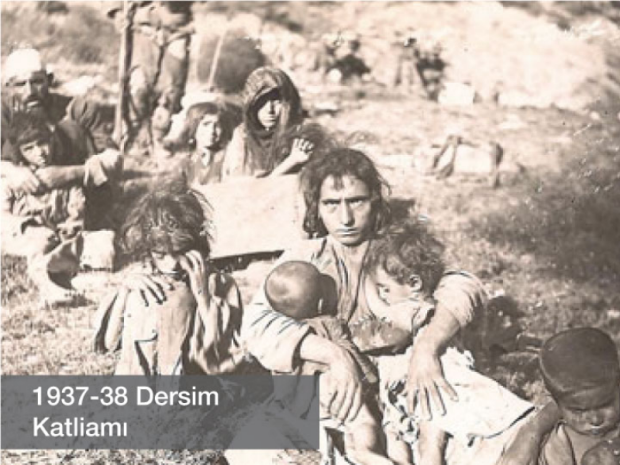
From the documentary The Lost Girls of Dersim 1938:
“They instantly cut my hair and made me into a boy.”
“There were soldiers next to me. Some were smiling and laughing out loud. But I was crying. The soldier buzzed my hair. He turned me into kel oglan.”
“I don’t know my grandmother. I don’t know if she survived or died or plunged herself into the waters.”
“The lady was saying ‘Kurdish girl, don’t wash your own dishes along with ours.’ Yes mam. I want my death. I won’t hurt at all. I’ll hang myself but there is nowhere to do so. I’ll jump off of the building but who will look after me if I don’t die. I’m a girl, a child.”
“I fasted for three days. I called out to the prophet and said, ‘either kill me, or take me away.’ I don’t know Turkish. This lady is a bad lady.”
“I was the earth, I resisted and did not lose my identity. Finally I couldn’t stand it and ran away. The police caught me. I told them ‘kill me but don’t send me to that woman’s house.’ He handed me to a rich man who owned a sugar factory. I was doing everything, cooking etc. I had curly hair, the lady of the house didn’t want me to let down my hair. She would tell me to tie it, to braid it. I wanted to walk around like the young girls in Samsun. She wouldn’t let me. When the man would see me, he would start kissing me. He would sit me on his lap.”
The 6-7 September Events [The Anti-Greek Pogrom of 1955 in Istanbul]
The 1965 Forced Deportation of Greeks
The Unsolved / Extrajudicial Killings of the 1990s
From Holding Up the Photograph Away: Experiences of Women whose Spouses were Forcibly Disappeared by the Memory Center:
“The soldiers came and raided our house. They were on top of our furnitures, our beds. We were poor, our beds were old, they raided on top of them. They stepped on them, they dirtied all of them up.”
“At the time I was pregnant and he kicked me so hard that I flied 4 meters [13 feet] away. I flied 4 meters. I ended up in the middle of that chunk of cement and fell on the floor. I wondered what was going to happen to me.”
Forced Depopulation of Kurdish Villages in 1990s
The Yazidis who Fled Sinjar
August 2014
“We left our home back there, our animals were left outside. Now we are so thirsty we cannot talk.”
“Some people threw themselves off of mountains, some carried knives with them, in order not to be captured by ISIS.”
“We cannot go back to our village. Have them open the gates and we will even go by foot. We don’t even want transportation, we just want to go back.”
The Refugee Camp for Those who Fled from the Syrian War, Irbil
“al-Assad’s soldiers would tear apart women’s clothes and leave them out there like that. I heard that they would gather them in mosques and rape them, they would make pregnant women jump so that they would miscarry. Rapes occurred frequently in the villages, they weren’t able to do that in the cities with that much ease. The ones in villages were poor, they didn’t have any place to go either. That’s why they would more easily be caught by the regime’s soldiers. We were able to escape but many could not.
Refugee Women Waiting in the Line for Food, Irbil
August 2014
“We were left helpless and alone. I came to the Sinjar Mountain with my two children, we died out of thirst, there is not single drop of water to drink in this heat. Our home has been undone.”
“They took away all the women, they took away and forced all the young girls to marry them. They killed the ones who refused to marry.”
“They destroyed our home, our family. My mother, my sister, my brother, my fiancée… Thousands are over there (Sinjar city center), they won’t give them guns. Help!”
Yazidis who Fled and Took Refuge in the Refugee Camp
August 2014
“We sleep without beds, without blankets. Our bodies are bruised from lying down on rocks.”
“We don’t have no home, no nobody… We are left to ourselves. Our children are dying of hunger and thirst. My two children died on the road.”
“Our children have gone hungry for days now, they crying ‘we are hungry.’ My relatives, my mother-in-law is left over there. We cannot go there to take them away.”
Yazidi Refugees
August 2014
“They killed our youngsters, our women, our brides.”
“Our animals were left out in the desert. Our elders could not flee. We have nothing to eat.”
“We were at home. They said ISIS arrived, we started fleeing in the morning. ISIS captured us. They told us to sell out on our religion. They told us to accept their religion.”
Women from Gaza
Recounted by the only woman photojournalist in Gaza, Eman Mohammed; source: Çiçek Tahaoğlu, Bianet:
“The most basic thing they taught us was that, if you cannot hear anything, it means the bombs are coming your way. They are so noisy that you cannot hear anything. One day we visited a region in the North. There was an air raid. All of a sudden, we couldn’t hear anything at all. The first vehicle I went to was full, I headed towards the second vehicle. I tried opening the door but it was locked. I started hitting the door. They said there was no more space for me in the vehicle and left.”
[Recounted by Women in Gaza]
“I tried to return to the village with my family in hiding. I had to walk barefoot on Mount Carmel so that the Israeli soldiers would not notice. My baby died in my arms because of illness. I buried my baby with my own hands on the road.”
“When part of my home was bombed, I panicked and tried to flee with my baby in my arms. But, when I left my home, I noticed that I was holding a pillow instead of my baby. I cried and screamed as I watched my home collapsed before I could save my baby.”

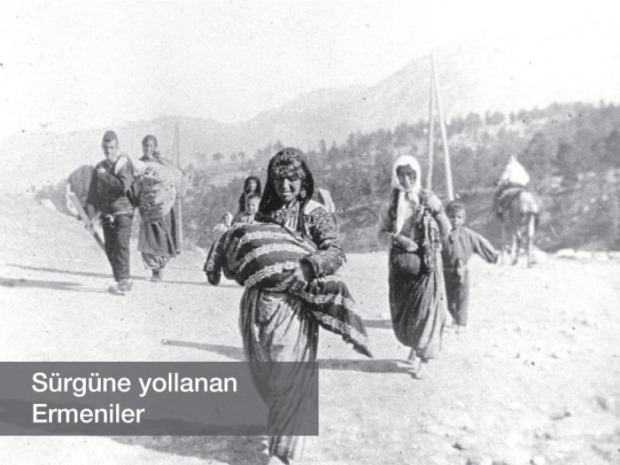
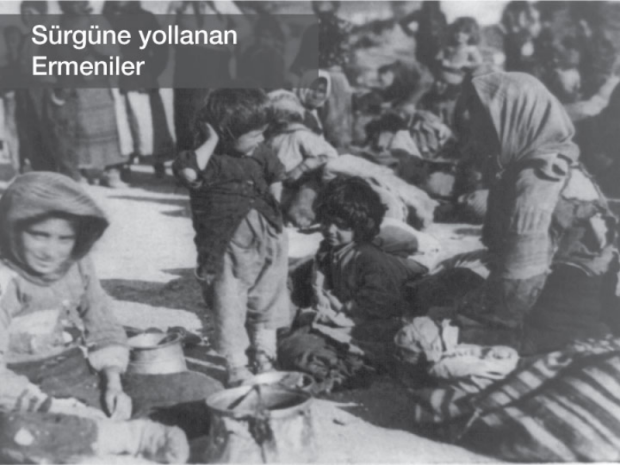



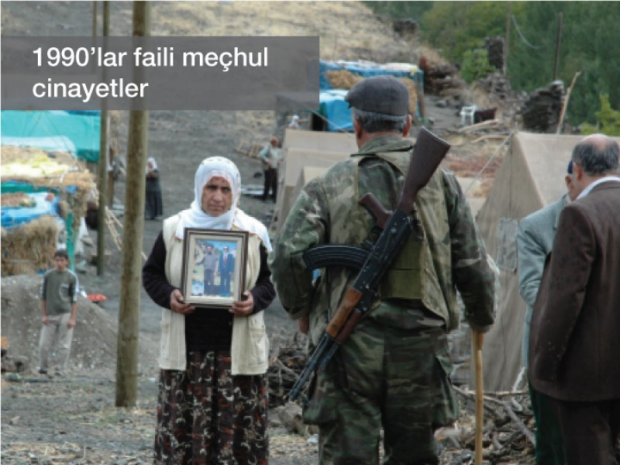
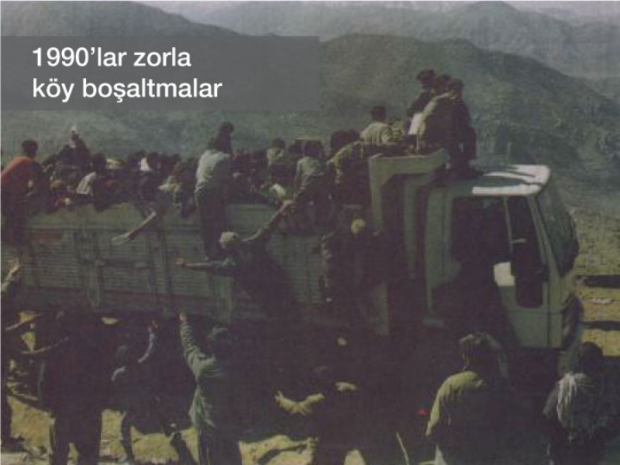
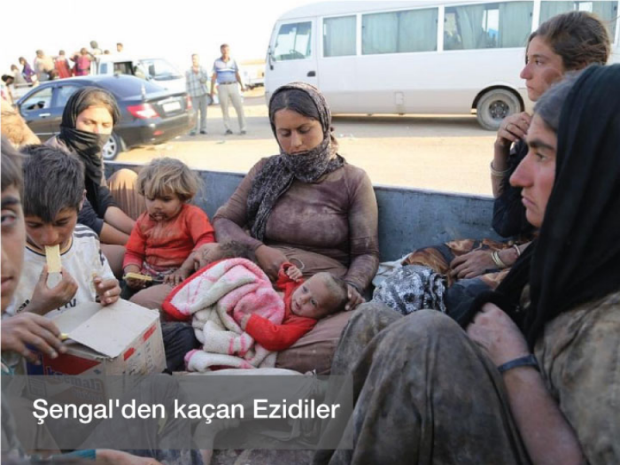


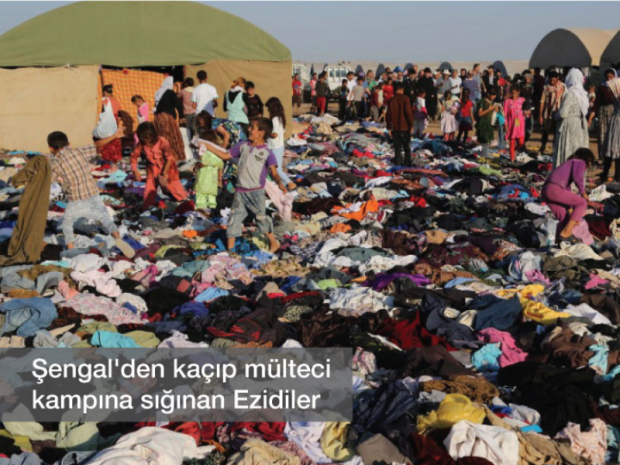


Words cannot express the depth of pain and anger I felt reading this. But it strengthens my resolve to do all I can to help women gain the power they need to end these cycles of violence and inhumanity.